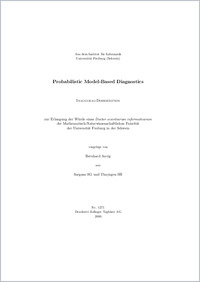Probabilistic model-based diagnostics
- Anrig, Bernhard
- Kohlas, Jürg (Degree supervisor)
-
01.04.2000
xii, 240 p
English
German
This thesis presents the concept of general argumentation systems, a framework for representing uncertain knowledge using information algebras and information systems as well as probability algebras. Argumentation systems are a generalization of assumption-based systems and propositional argumentation systems and can deal with very general formalisms. We show also that an argumentation system itself is a special case of an information system. We focus on argumentation systems as a tool for doing model-based diagnostics of complex systems built of components. Given a system and observations, this knowledge is modeled in the framework of an argumentation system. If the observations are not as predicted from the specification of the system, we have a diagnostic problem. Then, using concepts which are built on top of the argumentation system (such as generalized hints and allocations of support), conflicts and diagnoses, arguments, etc. for the system can be computed. Diagnoses of a system which does not work as it is supposed to, can then be used to define repair or replacement strategies for the components of the system. The set of diagnoses is often too big to be computed explicitly, but we define a logical framework for the description of sets of diagnoses. A main ingredient of an argumentation system is probabilistic knowledge of some parts of the available information, essentially knowledge about the modes of the components. This probabilistic knowledge allows to define allocations of probability and allocations of belief on top of the argumentation systems. Using these allocations, the symbolical results are weighed and discrimination between them is possible. Further, we present algorithms for efficient computation of the probability of logical representations of sets of arguments without explicitly computing the sets. The local computation framework of Shenoy & Shafer can be applied to argumentation systems. We show also how additional information can be added to an argumentation system, i.e. how argumentation systems are combined. Combination of argumentation systems can also be replaced by combination of the generalized hints, the allocations of arguments or belief defined on top of them. Further, we address the problem of how additional information about the system can be obtained, especially where further measurements should take place in order to obtain a maximal expected gain of information in the argumentation system; this is useful for a sequential process of discrimination of diagnoses in the system. Finally, we present the language ABEL, an implementation of a special type of argumentation system. Several examples are presented in order to show the strength of argumentation systems.
In dieser Arbeit führen wir das Konzept von Argumentations-Systemen ein, die ein Hilfsmittel zur Repräsentation von unsicherer Information mit Hilfe von Informations-Algebren und -Systemen sowie Wahrscheinlichkeits-Algebren darstellen. Argumentations-Systeme sind eine Verallgemeinerung von Annahmen- basierten System und propositionellen Argumentations-Systemen und können sehr allgemeine Formalismen handhaben. Wir zeigen auch, dass Argumentations-Systeme ein Spezialfall von Informations-Systemen darstellen. Schwerpunkt dieser Arbeit ist die Verwendung von Argumentations-Systemen als geeignete Hilfsmittel für Modell-Basierte Diagnostik von komplexen Systemen. Wir betrachten Systeme, welche aus verschiedenen Bausteinen aufgebaut sind. Das System und die Beobachtungen werden zuerst in einem Argumentations- System modelliert. Wenn die Beobachtungen nicht dem Verhalten des Systems gemäss der Spezifikation entsprechen, so sind wir mit einem Diagnose- Problem konfrontiert. Dann verwenden wir Konzepte (z.Bsp. verallgemeinerte Hinweise, Allokationen von Support), welche auf dem Argumentations-System aufbauen, um Konflikte, Diagnosen, Argumente, etc. für das System zu berechnen. Die Diagnosen eines Systems, dessen Verhalten nicht den Spezifikationen entspricht, können für die Ausarbeitung von Reparatur- oder Austauschstrategien für die Komponenten des Systems verwendet werden. Die Menge der Diagnosen ist oft zu gross um explizit berechnet zu werden, aber wir definieren eine logische Sprache für die Repräsentation von Mengen von Diagnosen. Ein weiterer Hauptbestandteil eines Argumentations-Systems sind probabilistische Aussagen über Teile der vorhandenen Information, hauptsächlich Aussagen über die verschiedenen Arbeits-Modi der Komponenten. Diese Aussagen werden dazu verwendet, Wahrscheinlichkeits- und Belief-Allokationen auf einem Argumentations-System aufzubauen. Wir brauchen dann solche Allokationen, um die symbolischen Resultate zu bewerten und zu unterscheiden. Des weiteren definieren wir Algorithmen zur effizienten Berechnung der Wahrscheinlichkeit von logischen Repräsentation von Mengen von Diagnosen, wobei die Mengen nicht explizit berechnet werden müssen. Die Methoden zur lokalen Berechnung von Shenoy & Shafer können auch auf Argumentations-Systeme angewandt werden. Wir zeigen weiter, wie neu auftauchende Information in ein Argumentations-System integriert werden kann, d.h. wie Argumentations-Systeme kombiniert werden. Diese Kombination kann auch auf den darauf aufbauenden Konzepten wie verallgemeinerte Hinweise, Allokationen von Support oder Wahrscheinlichkeits-Allokationen durchgeführt werden. Im weiteren behandeln wir das Problem der Beschaffung von zusätzlicher Information über das System; speziell interessiert uns die Auswahl eines Messpunkts im System, so dass die Messung einen maximalen Erwartungswert von zusätzlicher Information liefert; dies ist nützlich in sequentiellen Verfahren zur Ausscheidung von Diagnosen.
- Faculty
- Faculté des sciences et de médecine
- Language
-
- English
- Classification
- Computer science and technology
- License
-
License undefined
- Identifiers
-
- RERO DOC 5041
- URN urn:nbn:ch:rero-002-101913
- RERO R277458960
- Persistent URL
- https://folia.unifr.ch/unifr/documents/299835
Statistics
Document views: 323
File downloads:
- Texte intégral: 545
